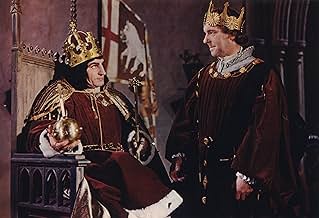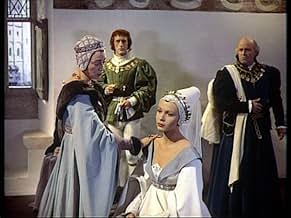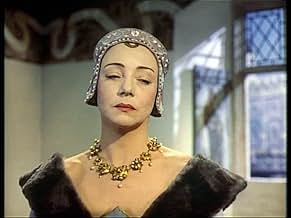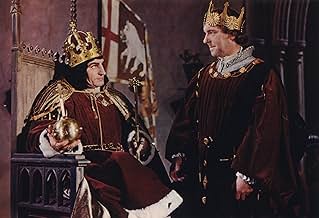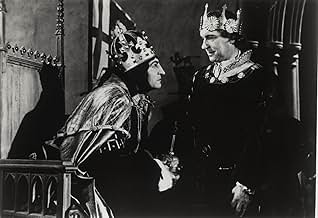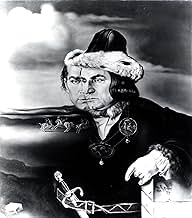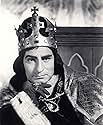Richard III
- 1955
- Tous publics
- 2h 41m
IMDb RATING
7.3/10
5.7K
YOUR RATING
A tale of the wicked deformed King and his conquests, both on the battlefield and in the boudoir.A tale of the wicked deformed King and his conquests, both on the battlefield and in the boudoir.A tale of the wicked deformed King and his conquests, both on the battlefield and in the boudoir.
- Nominated for 1 Oscar
- 9 wins & 3 nominations total
Wallace Bosco
- Monk
- (as Wally Bascoe)
Featured reviews
It may not be the best film of a Shakespeare play but surely there is no better Shakespearean performance on film than Laurence Olivier's "Richard III". He had already done "Henry V" and "Hamlet" on screen, winning Oscars for both, (an Honorary one for his "Henry V"), but 'Richard ...' was always considered the lesser, more fanciful play with an Elizabethan Godfather in charge yet Olivier made it his own, creating a Richard by which all others would be judged.
It's less 'cinematic' than either "Henry V" or "Hamlet", (the sets look like sets), but here 'the play's the thing' and Olivier cast it perfectly. Knights Gielgud and Hardwicke are quickly dispatched as Clarence and Edward but Ralph Richardson is a magnificently malevolent Buckingham, Mary Kerridge, a magnificent Queen Elizabeth and Claire Bloom, a sublime Lady Anne. It is also one of the most accessible of all Shakespeare adaptations; Shakespeare for those who don't like Shakespeare and a 'thriller' that genuinely thrills.
It's less 'cinematic' than either "Henry V" or "Hamlet", (the sets look like sets), but here 'the play's the thing' and Olivier cast it perfectly. Knights Gielgud and Hardwicke are quickly dispatched as Clarence and Edward but Ralph Richardson is a magnificently malevolent Buckingham, Mary Kerridge, a magnificent Queen Elizabeth and Claire Bloom, a sublime Lady Anne. It is also one of the most accessible of all Shakespeare adaptations; Shakespeare for those who don't like Shakespeare and a 'thriller' that genuinely thrills.
One of Olivier's most notable performances which set a precedent for how the role should be played. The eccentricity of the ambitious, crippled and sadistic, Richard of Gloucester makes for a surprisingly funny yet dark tragedy.
Olivier's expertise in stage technique, married with an exceptional talent, makes for shots that last for more than a minute before the cut while he delivers the goods to camera.Set mainly in a castle ,simple but true to stage, with powerful monologues from all concerned.The dialect used is easier for the novice Shakespearian to understand than it is in some other such plays.
The ultimate treacherer who can,"add colours to the camelian and set the murderous Machiavelli to school".He makes no secret to the audience of his villainous disposition.Likewise the role makes no secret of Sir Larry's brilliance. Filled with classic lines such as,"a horse ..my kingdom for a horse!" and ,"Now is the winter of our discontent made glorious summer..." . this film ,true to Shakespeare's other work has the mixture of tragedy and comedy, historic fact meets convenient fiction with a splash of romantic betrayal.. Utterly outrageous !
Olivier's expertise in stage technique, married with an exceptional talent, makes for shots that last for more than a minute before the cut while he delivers the goods to camera.Set mainly in a castle ,simple but true to stage, with powerful monologues from all concerned.The dialect used is easier for the novice Shakespearian to understand than it is in some other such plays.
The ultimate treacherer who can,"add colours to the camelian and set the murderous Machiavelli to school".He makes no secret to the audience of his villainous disposition.Likewise the role makes no secret of Sir Larry's brilliance. Filled with classic lines such as,"a horse ..my kingdom for a horse!" and ,"Now is the winter of our discontent made glorious summer..." . this film ,true to Shakespeare's other work has the mixture of tragedy and comedy, historic fact meets convenient fiction with a splash of romantic betrayal.. Utterly outrageous !
It was Olivier's production of HENRY V that led to his showing what a creative producer/director of film he could be. His Oscar came from his "Freudian" interpretation of HAMLET. But I suspect that most people would say his greatest Shakespearean film (both as star and director) was this one - his performing the greatest villainous role in the English language, King RICHARD III.
One can carp about the historical accuracy of RICHARD III from now until doomsday. That monarch was attacked by two of England's leading literary figures: Sir Thomas More (who is also a political/religious martyr), and Shakespeare. In comparison only two literary figures of any consequence ever defended him: Horace Walpole (the 18th Century diarist and letter writer - best recalled, if at all, for his Gothic novel THE CASTLE OF OTRANTO) and Josephine Tey, the dramatist and mystery novelist who wrote a detective story, THE DAUGHTER OF TIME, to defend him. More, a Tudor government official (eventually Lord Chancellor, before he fell from official favor) was close to one of Richard's foes, Cardinal Morton, and so accepted Morton's stories about Richard's murderous guilt. He wrote a HISTORY OF RICHARD III. Shakespeare, to keep official favor with the court, had to placate it with it's glorification of Henry VII, and vilification of the monarch who Henry defeated and killed. Walpole, a student of 18th Century skepticism and scholarship, wrote SOME QUESTIONS REGARDING RICHARD III, which point by point debated the so-called crimes Richard committed. Walpole, however, also was convinced that the pretender, Perkins Warbeck (executed 1499) was actually the younger one of the two Princes in the Tower. Tey used her gifts as a mystery novelist to examine the case as an intellectual puzzle for a recuperating Inspector Adam Grant in the novel. But she is basing her views on work done up to about 1935 or so, especially the Life of Richard III by the exploration historian Sir Clement Markhams. Today we realize more information from contemporary documents have come out. The balanced view is that Richard is truly a usurper (but this was par for the political course of 1483, especially after all of the blood and plotting of the War of the Roses). However, his actual planning of the deaths of Henry VI and his son, of George, Duke of Clarence, of Lords Rivers, Grey, and Hastings, and of his two nephews has never been conclusively shown (it could have been his one time ally the Duke of Buckingham, or his enemy Henry, Earl of Richmond/Henry VII, or even Cardinal Morton!).
But without a dramatist or novelist of Shakespeare's stature, we are left with only Shakespeare's Richard - the finest example of a Machiavellian monarch on stage. So it is that the role can never be played poorly, unless by some stupid concept thrown in by a director (witness Richard Dreyfus's having to play Richard as an over-the-top homosexual in THE GOODBYE GIRLS due to Paul Benedict's idiot scheme of production). An example of the universality of the role was shown by Sir Ian McKellan's version a decade ago, set in the 1930s, suggesting Richard as a potential Fascist leader of Great Britain (complete with his "Hog" symbol used in place of a swastika). That film version too was wonderful.
Olivier is ably assisted by his cast of Richardson, Guilgud, Baker, Hardwicke, Bloom, and the others who show what happens when a power-hungry monster is allowed to divide and conquer his opponents, and then seize total power. There are moments in the film where Olivier's real personality comes out in frightening intensity. One is where he is playing with the two nephews, and when one teasingly refers to his humpback, the camera and lighting shows an intense hatred and anger rising from his eyes (the boys, by the way, notice it and cower). The other is the point when Richard decides to rein in his erstwhile ally in his rise, Buckingham (Richardson) who is at court to present his request for some payment for his assistance. Richard shouts impatiently "I'm not in the giving mood today!", and crashes his scepter down narrowly missing Buckingham's hand. The Duke notices this, and soon is off on his ill-fated rebellion.
RICHARD III was a first rate film - in my opinion it may be the best filmed version of a Shakespeare play made before 1980. It is regrettable that,whatever the reason, Olivier never directed another Shakespearean film (he planned at least one I would have been interested in - CORIOLANUS - which never got beyond the stage production). So enjoy the three we have, and his performances in the films OTHELLO and AS YOU LIKE IT, and the television versions of his THE MERCHANT OF VENICE and KING LEAR. It's all we'll ever have.
One can carp about the historical accuracy of RICHARD III from now until doomsday. That monarch was attacked by two of England's leading literary figures: Sir Thomas More (who is also a political/religious martyr), and Shakespeare. In comparison only two literary figures of any consequence ever defended him: Horace Walpole (the 18th Century diarist and letter writer - best recalled, if at all, for his Gothic novel THE CASTLE OF OTRANTO) and Josephine Tey, the dramatist and mystery novelist who wrote a detective story, THE DAUGHTER OF TIME, to defend him. More, a Tudor government official (eventually Lord Chancellor, before he fell from official favor) was close to one of Richard's foes, Cardinal Morton, and so accepted Morton's stories about Richard's murderous guilt. He wrote a HISTORY OF RICHARD III. Shakespeare, to keep official favor with the court, had to placate it with it's glorification of Henry VII, and vilification of the monarch who Henry defeated and killed. Walpole, a student of 18th Century skepticism and scholarship, wrote SOME QUESTIONS REGARDING RICHARD III, which point by point debated the so-called crimes Richard committed. Walpole, however, also was convinced that the pretender, Perkins Warbeck (executed 1499) was actually the younger one of the two Princes in the Tower. Tey used her gifts as a mystery novelist to examine the case as an intellectual puzzle for a recuperating Inspector Adam Grant in the novel. But she is basing her views on work done up to about 1935 or so, especially the Life of Richard III by the exploration historian Sir Clement Markhams. Today we realize more information from contemporary documents have come out. The balanced view is that Richard is truly a usurper (but this was par for the political course of 1483, especially after all of the blood and plotting of the War of the Roses). However, his actual planning of the deaths of Henry VI and his son, of George, Duke of Clarence, of Lords Rivers, Grey, and Hastings, and of his two nephews has never been conclusively shown (it could have been his one time ally the Duke of Buckingham, or his enemy Henry, Earl of Richmond/Henry VII, or even Cardinal Morton!).
But without a dramatist or novelist of Shakespeare's stature, we are left with only Shakespeare's Richard - the finest example of a Machiavellian monarch on stage. So it is that the role can never be played poorly, unless by some stupid concept thrown in by a director (witness Richard Dreyfus's having to play Richard as an over-the-top homosexual in THE GOODBYE GIRLS due to Paul Benedict's idiot scheme of production). An example of the universality of the role was shown by Sir Ian McKellan's version a decade ago, set in the 1930s, suggesting Richard as a potential Fascist leader of Great Britain (complete with his "Hog" symbol used in place of a swastika). That film version too was wonderful.
Olivier is ably assisted by his cast of Richardson, Guilgud, Baker, Hardwicke, Bloom, and the others who show what happens when a power-hungry monster is allowed to divide and conquer his opponents, and then seize total power. There are moments in the film where Olivier's real personality comes out in frightening intensity. One is where he is playing with the two nephews, and when one teasingly refers to his humpback, the camera and lighting shows an intense hatred and anger rising from his eyes (the boys, by the way, notice it and cower). The other is the point when Richard decides to rein in his erstwhile ally in his rise, Buckingham (Richardson) who is at court to present his request for some payment for his assistance. Richard shouts impatiently "I'm not in the giving mood today!", and crashes his scepter down narrowly missing Buckingham's hand. The Duke notices this, and soon is off on his ill-fated rebellion.
RICHARD III was a first rate film - in my opinion it may be the best filmed version of a Shakespeare play made before 1980. It is regrettable that,whatever the reason, Olivier never directed another Shakespearean film (he planned at least one I would have been interested in - CORIOLANUS - which never got beyond the stage production). So enjoy the three we have, and his performances in the films OTHELLO and AS YOU LIKE IT, and the television versions of his THE MERCHANT OF VENICE and KING LEAR. It's all we'll ever have.
This excellent production of "Richard III" features a terrific performance by Laurence Olivier in the lead role, plus a fine supporting cast, good color photography, and plenty of color and pageantry to set off the action. Richard III can be one of Shakespeare's most entertaining plays when it is done well, and this version does full justice to this classic play. It's especially enjoyable if you get the restored widescreen version.
Olivier is unsurpassed at performing Shakespeare, keeping the balance between giving life to his characters while making sure that they remain part of the play as a whole, rather than drawing all the attention to himself. This might be the best of all his screen Shakespearean roles, since Richard gives him so much to work with, and also because he has such an accomplished supporting cast to complement his own performance. Playing Richard gives him a chance to be charming, devious, tyrannical, and more, and the role offers some choice solo speeches plus other scenes that have excellent give-and-take with the other characters.
The rest of the cast also deserves praise. Ralph Richardson is ideally cast as Buckingham, a character who is so important both to the plot and also to showing us what Richard himself is all about. The rest of the cast includes good performances from Cedric Hardwicke, John Gielgud, Claire Bloom, and others. Olivier's adaptation/revision of the script also works pretty well, maintaining the feel of the play while often highlighting scenes that make for particularly good cinema. It all makes this just what a movie version of Shakespeare should be.
Olivier is unsurpassed at performing Shakespeare, keeping the balance between giving life to his characters while making sure that they remain part of the play as a whole, rather than drawing all the attention to himself. This might be the best of all his screen Shakespearean roles, since Richard gives him so much to work with, and also because he has such an accomplished supporting cast to complement his own performance. Playing Richard gives him a chance to be charming, devious, tyrannical, and more, and the role offers some choice solo speeches plus other scenes that have excellent give-and-take with the other characters.
The rest of the cast also deserves praise. Ralph Richardson is ideally cast as Buckingham, a character who is so important both to the plot and also to showing us what Richard himself is all about. The rest of the cast includes good performances from Cedric Hardwicke, John Gielgud, Claire Bloom, and others. Olivier's adaptation/revision of the script also works pretty well, maintaining the feel of the play while often highlighting scenes that make for particularly good cinema. It all makes this just what a movie version of Shakespeare should be.
In many ways this is a stage-bound adaptation and with Olivier in the lead role this is not a bad thing. After all he was one of the theatre greats of the twentieth century.
In Richard III, Olivier constantly turns and talks to the audience with his devilish plans to ascend to the throne of England. Aided by his cousin the Duke of Buckingham (Ralph Richardson) he soon replaces King Edward IV (Cedric Hardwicke), rids himself of his other brother George (John Gielgud) and dispatches his young nephews to the tower and then brings their tender lives to a premature end.
The deformed, despicable hunchback even seduces the widow of a man he murdered for his own purposes, Lady Anne (Claire Bloom).
Once Richard ascends to the throne he finds that he has to do battle with a rival who also stakes a claim to the hollow crown.
This is a chance to see Olivier, still in his pomp speaking the Bard's verse. Unfortunately the accompanying music is too bombastic and Olivier's death scene verges on the ham.
In Richard III, Olivier constantly turns and talks to the audience with his devilish plans to ascend to the throne of England. Aided by his cousin the Duke of Buckingham (Ralph Richardson) he soon replaces King Edward IV (Cedric Hardwicke), rids himself of his other brother George (John Gielgud) and dispatches his young nephews to the tower and then brings their tender lives to a premature end.
The deformed, despicable hunchback even seduces the widow of a man he murdered for his own purposes, Lady Anne (Claire Bloom).
Once Richard ascends to the throne he finds that he has to do battle with a rival who also stakes a claim to the hollow crown.
This is a chance to see Olivier, still in his pomp speaking the Bard's verse. Unfortunately the accompanying music is too bombastic and Olivier's death scene verges on the ham.
Did you know
- TriviaMichael Gough got his part (Dighton, the first murderer) by making a fuss to his fellow actor friends about only established stars getting cameo parts and leaving nothing for struggling actors like him. One night he got a phone call, and a voice said "You've been stirring it, haven't you? Right little shit." Gough demanded to know, "Who is this?" only to be stunned by the response, "It's Larry", which of course was Sir Laurence Olivier. Olivier was just having some fun at Gough's expense, had taken on-board his criticisms and was ringing to offer him the part of one of the murderers in this movie. When asked which one he wanted to play, Gough quickly said "Whichever one has the most lines", and he got his wish. Olivier arranged matters so that Gough's scenes were split over several days, instead of all being done in one day, so that Gough would maximize his per diem fee.
- GoofsIn the scene when Richard tells King Edward of Clarence's supposed treason, two monks are singing hymns from a large book: their lips are not only out of sync with their singing, but with each other.
- Quotes
Richard III: I'll drown more sailors than the mermaid shall,/ I'll play the orator as well as Nestor,/ Deceive more slyly than Ulysses could,/ And, like a Sinon, take another Troy./ I can add colours to the chameleon, /Change shapes with Proteus for advantages, /And set the murderous Machiavel to school./ Can I do this,and cannot get a crown?/Tut, were it farther off,/ I'll pluck it down.
- Crazy creditsMost of the film's credits are shown at the end. The opening credits show only the title of the film, William Shakespeare's name, and the names of the main actors.
- Alternate versionsReleased in Great Britain at 155 minutes; some of the prints released in the USA are 139 minutes.
- ConnectionsFeatured in Great Acting: Laurence Olivier (1966)
Details
- Release date
- Country of origin
- Languages
- Also known as
- 3. Richard
- Filming locations
- La Mancha, Castilla-La Mancha, Spain(Bosworth Field scenes)
- Production companies
- See more company credits at IMDbPro
- Runtime
- 2h 41m(161 min)
- Color
Contribute to this page
Suggest an edit or add missing content


